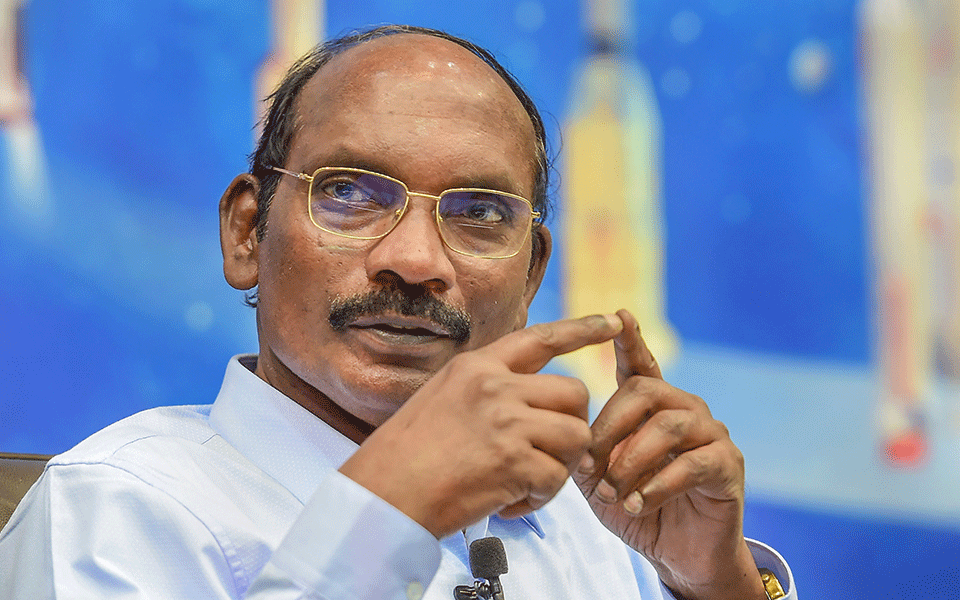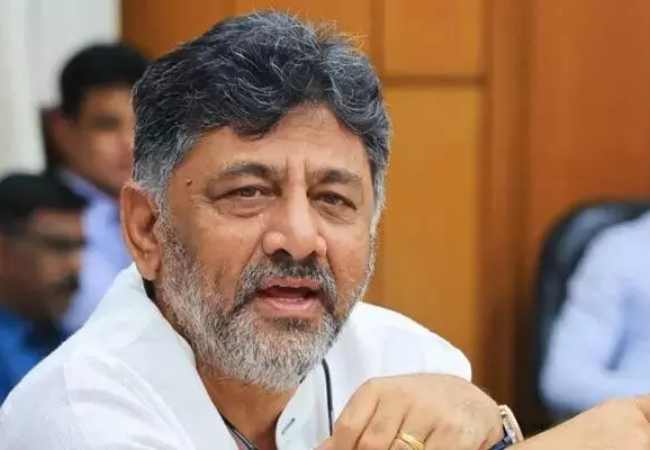Bengaluru: The recently announced space sector reforms are not aimed at privatisation of Indian Space Research Organisation (ISRO), its Chairman and Secretary in the Department of Space, K Sivan asserted on Thursday.
The space agency also stated that the draft on the proposed space activity bill is almost final and it will soon be placed before the Union Cabinet for approval.
"When space sector reforms were announced by the government there were many misconceptions like it would lead to privatisation of ISRO. It is not. Again and again I'm repeating it is not the privatisation of ISRO," Sivan said.
Addressing a webinar on "Unlocking of India's Potential in Space Sector," he said the whole aim of reforms is enabling the private players to carry out the space activities which is otherwise being done by ISRO.
"In fact, the activities of ISRO are going to increase and ISRO will be able to better utilise its resources in taking up developmental as well as capacity building activities of the government, rather than the routine production activity," he added.
The Union Cabinet on June 24 approved participation of the private sector in the entire range of space activities, including planetary exploration missions.
It had said, the newly-created Indian National Space Promotion and Authorisation Centre (IN-SPACe) will provide a level playing field for private companies to use Indian space infrastructure, by hand-holding industries in space activities through encouraging policies and a friendly regulatory environment.
Also, the New Space India Limited (NSIL), a PSU under the Department of Space, will endeavour to re-orient space activities from a "supply driven" model to a "demand driven" model, thereby ensuring optimum utilisation of our space assets, it had said.
Noting that the space sector reform introduced by the government is going to be a "real game changer", Sivan said private sector participation in the space sector has been increasing worldwide and it is a healthy trend, as it increases diversity.
In India too space sector startups are taking developmental activities in both launch vehicles as well as in satellites, he said. However, there was no mechanism available in the country to extend technology and infrastructure support to them.
Also there was no regulatory mechanism to control the private sector activities, so an institutional mechanism has been created as part of reform.
The webinar was attended by Principal Scientific Advisor to government of India K Vijay Raghavan, Mahindra Group Chairman Anand Mahindra, Bharti Enterprises Chairman Sunil B Mittal among others.
Further observing that with the opening of the space sector, ISRO can focus on technology development and capacity building Sivan said in addition to that it will also facilitate private sector participation in major national missions through announcement of opportunity.
However, the private sector will have to do their own research and development activities, business viability studies, funding as well as finding customers for their services, he said.
Pointing out that import of communication satellites is now in the embargo list under 'Aatma Nirbhar Bharat Abhiyan', the ISRO Chief said there will be a need for large number of communication satellites to be launched in the immediate future and this could be a huge opportunity for ISRO and also for the private sector.
Launching a small satellite is another area where there is a huge projected demand and some startups are interacting with ISRO at an advanced stage and may launch very soon.
According to ISRO officials, more than 500 industries are currently involved in activities such as production of components and more than 80 per cent of the launch vehicle and 60 per cent of the spacecraft budget is spent on industry.
Scientific Secretary to ISRO, R Uma Maheshwaran said participation of the private sector in end-end space activities is definitely a strategy to expand the space economy.
Noting that the private sector is much eager now, he said a lot of people are coming forward to make launch vehicles, and satellites and providing space based services.
Uma Maheshwaran also said a mechanism is required regarding the indulgence of the private sector and for this, enactment of the space activity bill is a primary requisite.
"It (bill) is almost in its final shape now, we have presented it to the Ministry (PMO) for inter-ministerial consultation and we feel that very soon it will be approved by the Cabinet and presented to the Parliament for making it an act.
This is mandatory as India is signatory to the outer space treaty," he added.
Vijay Raghavan, noting a lack of risk capital for industry to sufficiently invest in R&D, said risk needs to be mitigated and for this the combination of talent and material resources, partnering with industry is needed.
The opening of the space sector in India will have its impact globally, and also all sectors in India, he said adding that ".. this is an opportunity to increase volume and quality in extraordinary ways."
Suggesting that space may well become the new "gold rush", Anand Mahindra said though India has an established and credible space programme, its share of the market is miniscule and he was sure that beginning now it will change with the entry of the private sector.
"... it is our opportunity to level the playing field, by leveraging our competitive advantages and we have to seize it now," he said, while admitting that industry and private sector are often "uneasy bedfellows", but we have to make these reforms work as it is the best way forward".
Sunil Mittal stressed on the need for the policy on participation of private sector in space programme to be "light-touch" but said it should be very strong on security, foreign policy aspects and some of the guidelines need to be very clear so that industry participants know how to operate within the policy framework.
Let the Truth be known. If you read VB and like VB, please be a VB Supporter and Help us deliver the Truth to one and all.
Bengaluru (PTI): Karnataka has proposed a new Information Technology Policy for 2025–2030, offering extensive financial and non-financial incentives aimed at accelerating investments, strengthening innovation and expanding the state's tech footprint beyond Bengaluru.
The Karnataka Cabinet gave its nod to the policy 2025–2030 with an outlay of Rs 445.50 crore on Thursday after the Finance Department accorded its approval.
The policy introduces 16 incentives across five enabler categories, nine of which are entirely new, with a distinctive push to support companies setting up or expanding in emerging cities.
Alongside financial support, the government is also offering labour-law relaxations, round-the-clock operational permissions and industry-ready human capital programmes to make Karnataka a globally competitive 'AI-native' destination.
According to the policy, units located outside Bengaluru will gain access to a wide suite of benefits, including research and development and IP creation incentives, internship reimbursements, talent relocation support and recruitment assistance.
The benefits also include EPF reimbursement, faculty development support, rental assistance, certification subsidies, electricity tariff rebates, property tax reimbursement, telecom infrastructure support, and assistance for events and conferences.
Bengaluru Urban will receive a focused set of six research and development and talent-oriented incentives, while Indian Global Capability Centres (GCCs) operating in the state will be brought under the incentive net.
Incentive caps and eligibility thresholds have been raised, and the policy prioritises growth-focused investments for both new and expanding units.
Beyond incentives, the government focuses on infrastructure and innovation interventions.
A flagship proposal in the policy is the creation of Techniverse -- integrated, technology-enabled enclaves developed through a public-private partnership model inside future Global Innovation Districts.
These campuses will offer plug-and-play facilities, artificial intelligence and machine learning and cybersecurity labs, advanced testbeds, experience centres, and disaster-resistant command centres.
There will also be a Statewide Digital Hub Grid and a Global Test Bed Infrastructure Network, linking public and private research and development, and innovation facilities across Karnataka.
The government has proposed a Women Global Tech Missions Fellowship for 1,000 mid-career women technologists, an IT Talent Return Programme to absorb experienced professionals returning from abroad, and broad-based skill and faculty development reimbursements.
Shared corporate transport routes in Bengaluru and tier-two cities will be designed with Bengaluru Metropolitan Transport Corporation and other transport entities to support worker mobility.
The government said the policy is the outcome of an extensive research and consultation process involving TCS, Infosys, Wipro, IBM, HCL, Tech Mahindra, Cognizant, HP, Google, Accenture and NASSCOM, along with sector experts and stakeholder groups.
It estimates an outlay of Rs 967.12 crore over five years, comprising Rs 754.62 crore for incentives and Rs 212.50 crore for interventions such as Techniverse campuses, digital grid development, global outreach missions and talent programmes.





